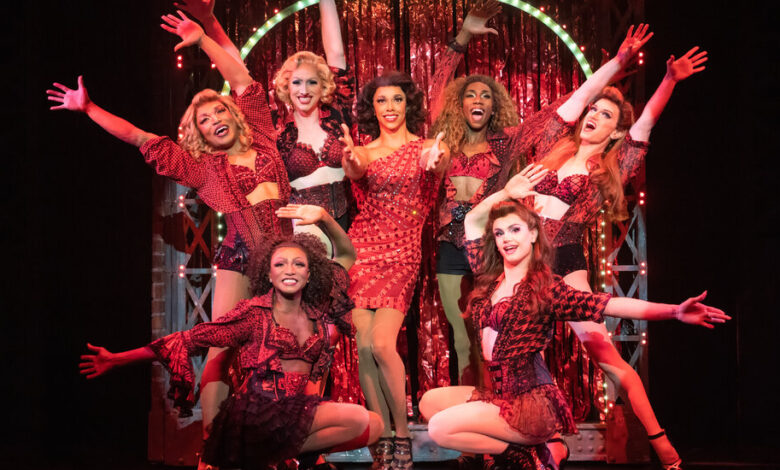Review: A Faithful ‘Kinky Boots,’ With All Its Pizazz and Pitfalls

You can’t keep a drag queen down, at least not for long. It was only April 2019 that the Cyndi Lauper and Harvey Fierstein musical “Kinky Boots” closed on Broadway after a six-year run, and already it’s back in town. The Britain-set show, in which the statuesque performer Lola saves a provincial shoe factory by inspiring a line of toweringly outré footwear, is now running Off Broadway.
But unlike the comebacks of shows such as “Jersey Boys” and “Rock of Ages,” which both reopened at the underground theatrical mall New World Stages, “Kinky Boots” is at the spacious Stage 42, which stands on 42nd Street and is large enough to accommodate a 25-person company and a minimally downsized version of the director Jerry Mitchell’s va-va-voom production.
But enough about real estate: How is Lola?
This, after all, is the role for which Billy Porter won a Tony in 2013, and it is a textbook Fierstein creation — bold and brassy, with big hair, bright nail polish and quick-fire quips barely concealing the scars of pain and rejection. There are expectations.
Happily, Callum Francis, who has played the part in Britain, Australia and, briefly, on Broadway, meets them. He is a delight not just as Lola but as her alter ego, Simon — it is hard to tell who the real person is, what real means in this context and whether it even matters. Unlike Porter, whose physical intensity often came across as combative swagger, Francis moves with a dancer’s grace, and Lola’s confidence has a slinky playfulness that is especially fun to watch in her early scenes with Charlie (Christian Douglas, whose performance is a little stiff).
Charlie is the earnest bloke trying to save his late father’s failing shoe company because the jobs of people he has known since he was a child depend on it. Lola provides him with life coaching and the idea that will eventually reinvent the business — to create and build “tubular sex,” that is, boots that are simultaneously strong and sexy. Both characters have complicated relationships with their fathers, and Lola shows not just Charlie but everyone onstage that there are many ways to be a man. That thread was also in the 2005 movie that inspired the musical, but here, the message feels super-Fiersteinian.
Simon’s wounded vulnerability is never too far underneath the glitter and takes center stage in the 11 o’clock power ballad “Hold Me in Your Heart.” The reveal of that song’s context hit harder in the original production because we had seen a little more of Lola’s back story — the roles of Young Simon and Young Charlie have been cut here. More subtle are tiny tweaks such as Lola’s welcome greeting, which has been expanded to “Ladies, gentlemen, theys, them and those who have yet to make up their minds!”
But, overall, the show looks and feels like a slightly sized-down photocopy of the original. Danielle Hope, for example, is very funny as Lauren, an employee at the factory, and her big solo, “The History of Wrong Guys,” is perfectly calibrated, but the rendition faithfully duplicates Annaleigh Ashford’s, who originated the role on Broadway. It looks as if Hope might be capable of coming up with her own shtick, and it would have been interesting to see the supporting cast receive a little more agency. But don’t worry, the conveyor belts still turn into treadmills for the exhilarating “Everybody Say Yeah” — a sterling example of Mitchell’s showmanship.
Considering this faithfulness to the original template, it is not surprising that the story’s less successful moments remain, too. Among them are the slightly preachy tone as well as Charlie’s sudden dark turn. According to Fierstein’s recent memoir, “I Was Better Last Night,” the show took nearly five years to complete, so you have to wonder how nobody could find an hour to refine this temporary personality transplant. The book also suggests an intriguing line of thought when Fierstein writes that the number “What a Woman Wants” expresses Lola’s “daring sexuality — as a cross-dressing heterosexual male.” You will have to stare extra-hard and perhaps do a bit of projecting to see that onstage, where Lola essentially manifests as a magical being. “The sex is in the heel,” as one song proclaims, but it would have been nice to transfer some from the boot to the character.
One seemingly big change that turns out not to matter is the shrinking of the band to half of its Broadway size. But here it is perfectly fine to go big on synthesizers because Lauper’s songs, packed with hooks, and Stephen Oremus’s sharp arrangements and orchestrations always made terrific use of electronics. This is the only score in recent Broadway history that sounds as if it were written by people who had set foot in a nightclub within the past 40 years, and the hi-NRG finale, “Raise You Up/Just Be,” sounds like it’s booming out of a float at a Pride parade. That’s a compliment, of course.
Kinky Boots
At Stage 42, Manhattan; kinkybootsthemusical.com. Running time: 2 hours 25 minutes.